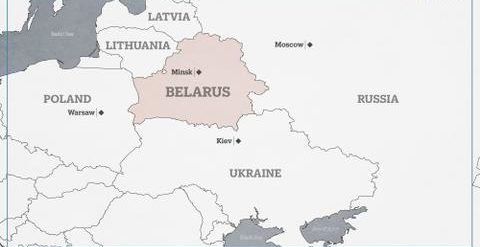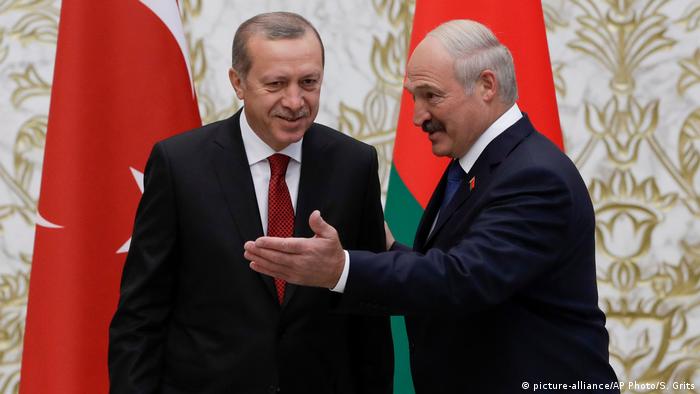Turkish President Recep Tayyip Erdoğan on Tuesday approved an investment promotion agreement with Belarus which is on the sanctions list of Turkey’s Western allies for supporting Russia in its invasion of Ukraine. The European Union, the United States and the United Kingdom this week announced new sanctions on Belarus along with Russia.
Turkey previously announced that it would not impose any sanctions on Russia, pursuing a different policy from the West. However, it is still surprising that Ankara has now ratified a long-waited agreement with a Russian ally while in pursuit of a balance between Russia and the West.
The agreement between Turkey and Belarus “Concerning the Reciprocal Promotion and Protection of Investments,” signed in Minsk in 2018, is a routine bilateral agreement. The aim of the agreement is to encourage foreign direct investment and to ensure that the investments made are protected according to the laws of the host country. In addition, the agreement clarifies the legal framework under which foreign investments in Belarus and Turkey can be subject to expropriation. Nordic Monitor has learned that Turkey has signed similar investment promotion agreements with 104 countries so far.
The agreement, which was sent to parliament by Erdoğan in November 2018 for approval, has been pending debate in the legislature since then.
The agreement ratified by the Turkish parliament on February 23 was approved by Erdoğan on March 1 and published in the Official Gazette on Wednesday as required by the constitution.
During the parliament session, no deputies spoke about the agreement, and even opposition lawmakers raised no objections to the approval of the untimely agreement, given the fact that Russian President Vladimir Putin had already signed decrees recognizing the sovereignty of Luhansk and Donetsk on February 21, a move that even Turkey protested.
The Office of the Speaker decides which legislative proposals are discussed on the parliament floor. Considering the current balance of power in Turkey, it does not seem possible for the speaker’s office to bring before lawmakers a proposal that the ruling party does not want to be included in the session agenda.
Under the Turkish constitution, Erdoğan has the right to approve legislation passed by parliament within 15 days or return it for further debate.
Meanwhile, President Erdoğan spoke on the phone with Belarusian President Alexander Lukashenko on Monday. According to the Office of the President, Erdoğan stated that Turkey would continue to make efforts to stop the war and establish peace.
The White House on Wednesday detailed a new slate of economic measures levied against Russia and its ally Belarus, condemning Belarus for “enabling (Russian President Vladimir) Putin’s invasion of Ukraine.” New restrictions include export control policies to Belarus.
“We will choke off Belarus’s ability to import key technologies,” Secretary of State Antony Blinken told reporters Wednesday. “And if Lukashenko’s support for the war continues, the consequences for his regime will escalate.”
The European Union on Wednesday stepped up sweeping economic sanctions against Belarus and blacklisted 22 senior military officers over Minsk’s role in the invasion. The Russian military has been using Belarus as an important launchpad for its ground and air assault on neighboring Ukraine. Experts claim that it is strategic for the Russians since the border between Belarus and Ukraine is much closer to Kyiv than to the Donbas region.

On Tuesday the UK government announced its first wave of sanctions on senior military figures in Belarus, specifically for their role in joining and facilitating the Russian invasion of Ukraine. The Belarusian chief of general staff, Maj. Gen. Victor Gulevich, and three other deputy defense ministers will all face sanctions, along with two military enterprises, The Guardian reported.
The International Paralympic Committee on Thursday banned athletes from Russia and Belarus from competing in the 2022 Beijing Winter Paralympics.
Nordic Monitor previously reported that a nuclear power agreement between Turkey and Belarus was criticized for including open-ended terms that are subject to broad interpretation and abuse of power. The Turkish opposition claimed that the wording of the agreement gave a broader mandate to the government to expand nuclear cooperation schemes beyond the intent and the scope of the agreement. It also allows the government to bypass legislative review to make changes to the agreement as it sees fit after it is ratified by parliament.
By: Levent Kenez
Source: Nordic Monitor



